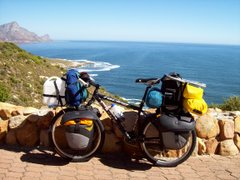




The mountainous area of Northern Pakistan is sometimes referred to as “The Roof of the World”. This is where the Himalaya-, Karakoram-, and Hindukush mountain ranges meet. Many of the highest mountains in the world are here, and we could cycle close by such peaks as Rakapohshi and Nanga Parbat. There are also many spectacular glaciers in the area, some of which come down practically to the road. The rushing rivers in the gorges (such as the Hunza-, Gilgit-, and Indus Rivers) are fed from these glaciers. Although we didn’t get visa’s for China, we wanted to visit this Northern region and decided to go as far as the Chinese border anyway. Instead of cycling the same road there and back, we took a bus up to the terminal at Alihabad in the Hunza valley. From Hunza we cycled on to the border (although we did get a lift on the last section up the pass – allowing us to leave our heavy luggage at the border town of Sost in the valley below). The Karakoram Highway (KKH) passes through the mountains, and is the land link between Pakistan and China. The term “highway” is a bit of a misnomer as the road is very narrow and prone to landslides. In many places the road surface has been destroyed, and once we even had to wait (dodging falling rocks) while the debris from a landslide was being cleared. However, the KKH is an engineering masterpiece, often hugging sheer cliffs high above the rivers, and cutting through spectacular narrow gorges. The border is up on the Khunjerab Pass, 4733 metres high. From the top of the pass we then cycled all the way back to Islamabad. Mostly, we stayed in small local hotels or camped (one camp site was just below the snout of the Passu Glacier). Understandably this is a very isolated region, so imagine my surprise when I came across a local youngster wearing a Western Province Rugby cap! (we obviously weren't the first South African visitors). As we moved South on our way back to Islamabad, we cycled through a conservative tribal area called Indus Kohistan. Here we had vivid memories of Ethiopia, as the local children also fancy throwing stones at tourists on bicycles. Other foreigners cycling the area seem to fear the stones more than the hills and road conditions, but we’d had a good dose of it in Africa and were now somewhat immune. The sharp rocks and potholes in the road took its toll on my heavy bike, causing a number of punctures and a damaged wheel rim. On our return to the camp site in Islamabad we were surprised to find some people still there from when we’d left more than 2 weeks before (waiting for visa’s!). At least our Indian visa’s were ready, although we were scolded for not picking them up at the stipulated time. We spent a few more days in Islamabad before moving on (the camp site is a convenient place for sorting out ourselves and the bikes). I did a makeshift repair job on the wheel rim, and the only spare tubes we could find were of such poor quality that one was leaking when I tested it in the shop. It was a case of “de-je-vous” for me when we left Islamabad for Lahore (at least I knew the way, and where we could overnight). On the second day we were struck by an incredible dust storm which turned the sky into night at 14h00 (I had enough sand in my ears to produce a crop of potatoes). Fortunately we found shelter under the dilapidated roof of a disused tea-house before the rain and hail came down (together with a bunch of locals and a few stray dogs). Wondering where we could stay the night if the storm persisted I spotted a “hotel” sign, but I was informed by a local that we were at that moment sheltering in what used to be the hotel. Now I’m in Lahore again, but staying in a different area than 6 weeks ago when I passed through the city (and Leana has not been here before, so it’s new for her anyway). The Indian border is less than 50 km from here, so we’ll head that way in a day or two. Daily distances cycled since first leaving Islamabed were:- Rawalpindi 17 km; Karimabad 7 km; Passu 51 km; Sost 41 km; Khunjerab Pass (down) 87 km; Karimabad 94 km; Gilgit 106 km; Thalechi 67 km; Chilas 71 km; Dassu 117 km; Pattan 53 km; Batagram 96 km; Abottabad 98 km; Islamabad 124 km; Jhelum 123 km; Gujranwala 100 km; and Lahore 82 km. (Total since start of journey in Cape Town - 26 601 km).









2 comments:
That's really Cool!
Need to repair your bike? Then why not visit www.smbbearings.com/BB_BRGS.htm for a great article about replacing your bike's bottom bracket bearings, the photos are a real help too.
Post a Comment